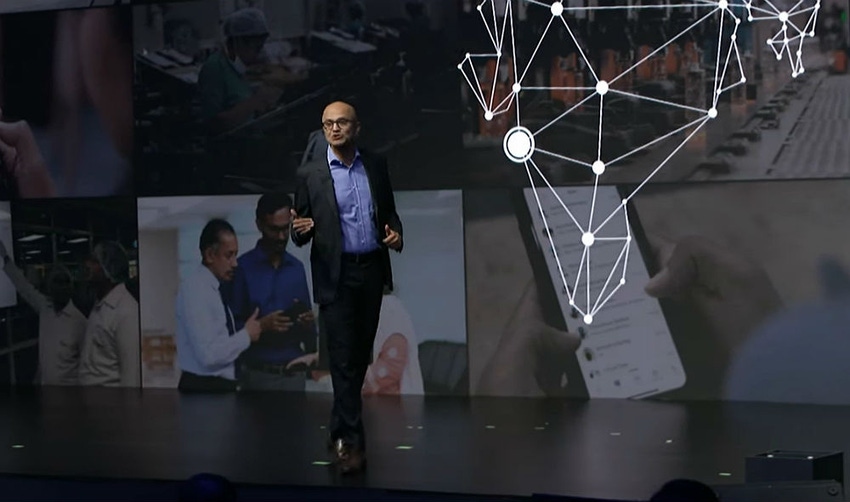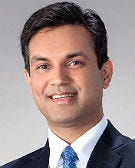The Digital India initiative has buoyed opportunities for IT partners.
February 25, 2020

(Pictured above: Microsoft’s Satya Nadella on stage at the company’s Future Decoded conference in Mumbai, India.)
Microsoft CEO Satya Nadella is in his home country of India this week where the company is doubling down on its effort to deepen its partnerships with technology solutions and service providers.
On the first of a three-day trip to India, Nadella addressed an audience of CEOs at Microsoft’s Future Decoded conference in Mumbai, where he talked up the company’s latest advances in AI, automation and tools to enable digital transformation.
Nadella described Microsoft’s drive toward a ubiquitous compute fabric with increasing intelligence in the cloud, at the edge, and the shift away from dependency on any one device, showcasing the company’s enabling tools and platforms including Azure, GitHub, LinkedIn, PowerApps and Teams.
“To me, it comes down to how every organization here in India can drive this wave,” Nadella said.
Anant Maheshwari, president of Microsoft India, told attendees that the country now has 560 million internet users and 460 million who use smartphones.

Microsoft’s Anant Maheshwari
“The data loop that this is creating is amongst the largest and growing the fastest across the world,” Maheshwari said. “And that creates tremendous opportunity for India to influence the world and influence where digital goes.”
Maheshwari added that the IT industry makes up $180 billion, approximately 8% of the country’s GDP. India is home of the world’s third largest ecosystem including 8,000 startups that are SaaS providers, a figure that has grown three times over the past five years, according to Maheshwari.
“If you take these two ends of the spectrum, we are part of leading the India transformation from both ends — the services side from the IT services and the innovation that’s happening in startups,” he said.
Over the past year, Microsoft has engaged in deeper partnerships with some of India’s largest IT services and infrastructure providers. Through its ITeS 360 initiative, Microsoft is encouraging some of its largest partners to create business units focused on the company’s core applications and solutions stack.
Among them, Tata Communications Services (TCS) formed a Microsoft business unit in November and HCL Technologies last month also formed one. Both are among India’s largest IT services, solutions and outsourcing providers. Last summer, Reliance Jio, a subsidiary of diversified energy and chemical conglomerate Reliance Industries, signed a broad 10-year partnership with Microsoft.
As part of that agreement, Jio is building data centers across India with the “next-generation” of compute, storage and network infrastructure where Microsoft will deploy its Azure platform. The first two datacenters are slated to go live this year in Gujarat and Maharashtra. Jio will also build solutions for clients based on the Azure platform.
India has rapidly arisen as a potentially lucrative growth market for companies that provide a wide variety of IT services throughout the country, where approximately 1.4 billion people represent the world’s second largest population.
The country has aggressively modernized its infrastructure following Prime Minister Narendra Modi’s Digital India initiative in 2014 to bring affordable and widely available broadband and modern wireless communications services throughout India.
Indeed, just a few years ago the best broadband service available was 256 Kbps, and now the average speed available in villages throughout India is 21 Mbps, according to Reliance chairman Mukesh Ambani, who joined Nadella on stage during yesterday’s Future Decoded speech.
It also wasn’t long ago that only 2G wireless service was widely available, Ambani added, noting that it came at the steep price of 10,000 rupees (approximately 139 USD) per Gb. Over the past three years, he said 380 million people have migrated to 4G technology, which now costs about 14 rupees, or 19 cents.
“I can easily say that the mobile networks in India now are better or on par with anybody else in the world,” Ambani said. “Consumption has also gone up and this has really become people’s movement. Because we have this infrastructure, we are accelerating, and we are just at the beginning of this whole journey.”
About the Author(s)
You May Also Like


